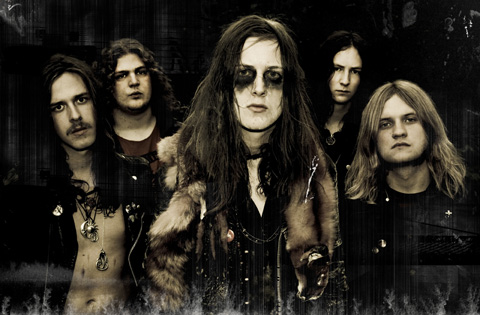
HIS OWN PRISON In Solitude frontman Pelle Åhman on 2011's The World, The Flesh, The Devil:
"We were bleeding and crying while making the album." |
When I am finally able to get through to the cell phone of In Solitude's tour manager, they have emerged from a massive dust cloud, their metal-mobile finding civilization after a long spell traversing the deserts of Arizona with no idea where they are going. The blistering sun and warping heat of the American Southwest would seem like a jarring contrast to the winterscapes that adorn the hills these Swedes call home. But once I get singer Pelle Åhman on the horn, it becomes clear that, regardless of the outer landscape, it is the long dark winter of the soul that is truly home to these metal visigoths. "Touring is a meditative state," Åhman explains brusquely, "with 30 minutes, daily, where you are consumed by fire and then hours upon hours where you must take your medication to get yourself through it. Music is an inward process, but everything you do alters your emotional world, and it is through this that I find inspiration."
Which is of course metal-speak for "touring gives us ideas for radical metal anthems." Something the band has done already, twice: first with their 2008 homonymous debut, then last year with their ante-upping The World, The Flesh, The Devil (Metal Blade). Both albums have long-horned goats adorning their covers, and both are packed front-to-back with a dynamic heavy-metal assault. Their tunefulness and twin-guitar blaze-chug have found the band tagged as "traditional," a categorization that sticks in their craw. "We get this feeling of putting forth a huge effort," says Åhman. "A devastating process that has changed our lives. And at the end the only thing that we hear from some people is that it sounds like Mercyful Fate, or something like that. What they don't see is that we were bleeding and crying while making the album."
So, okay, first point taken: don't suggest that the band does, indeed, sound like King Diamond and Co., in the best possible sense, what with their meaty riffs, high pitched screams, demonic themes, and melodramatic structures. As to point two: if you listen deeply to the band's music, it becomes clear that they aren't joking, that there is a darkness and deep sadness that is a million miles from most of the clowns making mock-trad-metal with built-in winks and nods. If the band is using the sonic palette of primo '80s riff-NWOBHM-metal, it is in service of a tormented internal sacrifice that is anything but cheesy or ironic, especially in the way that Åhman's voice conveys wounded martyrdom and pained pride. "We are traditional in the sense that the song structure is traditional, but I don't think the rest of it can be called traditional," says Åhman. "I mean, metal, if you look at the history of music, is still at its beginning. And I think, even within that, we are on our own, a bit."